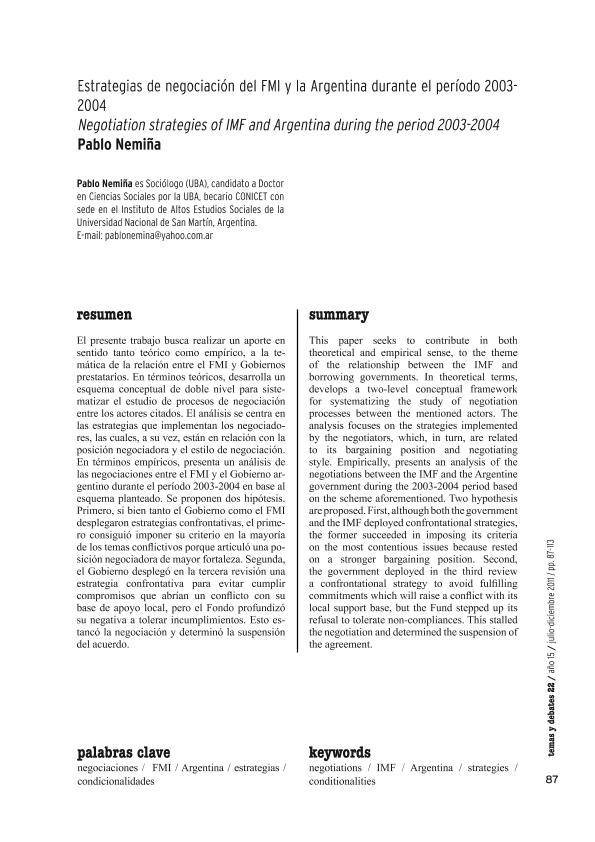Artículo
El presente trabajo busca realizar un aporte en sentido tanto teórico como empírico, a la temática de la relación entre el FMI y Gobiernos prestatarios. En términos teóricos, desarrolla un esquema conceptual de doble nivel para sistematizar el estudio de procesos de negociación entre los actores citados. El análisis se centra en las estrategias que implementan los negociadores, las cuales, a su vez, están en relación con la posición negociadora y el estilo de negociación. En términos empíricos, presenta un análisis de las negociaciones entre el FMI y el Gobierno argentino durante el período 2003-2004 en base al esquema planteado. Se proponen dos hipótesis. Primero, si bien tanto el Gobierno como el FMI desplegaron estrategias confrontativas, el primero consiguió imponer su criterio en la mayoría de los temas conflictivos porque articuló una posición negociadora de mayor fortaleza. Segunda, el Gobierno desplegó en la tercera revisión una estrategia confrontativa para evitar cumplir compromisos que abrían un conflicto con su base de apoyo local, pero el Fondo profundizó su negativa a tolerar incumplimientos. Esto estancó la negociación y determinó la suspensión del acuerdo. This paper seeks to contribute in both theoretical and empirical sense, to the theme of the relationship between the IMF and borrowing governments. In theoretical terms, develops a two-level conceptual framework for systematizing the study of negotiation processes between the mentioned actors. The analysis focuses on the strategies implemented by the negotiators, which, in turn, are related to its bargaining position and negotiating style. Empirically, presents an analysis of the negotiations between the IMF and the Argentine government during the 2003-2004 period based on the scheme aforementioned. Two hypothesis are proposed. First, although both the government and the IMF deployed confrontational strategies, the former succeeded in imposing its criteria on the most contentious issues because rested on a stronger bargaining position. Second, the government deployed in the third review a confrontational strategy to avoid fulfilling commitments which will raise a conflict with its local support base, but the Fund stepped up its refusal to tolerate non-compliances. This stalled the negotiation and determined the suspension of the agreement.
Estrategias de negociación del FMI y la Argentina durante el período 2003-2004
Título:
Negotiation strategies of IMF and Argentina during the period 2003-2004
Fecha de publicación:
12/2011
Editorial:
Universidad Nacional de Rosario. Facultad de Ciencia Política y Relaciones Internacionales
Revista:
Temas y Debates
ISSN:
1666-0714
Idioma:
Español
Tipo de recurso:
Artículo publicado
Clasificación temática:
Resumen
Palabras clave:
Negociaciones
,
FMI
,
Argentina
,
Estrategias
Archivos asociados
Licencia
Identificadores
Colecciones
Articulos(SEDE CENTRAL)
Articulos de SEDE CENTRAL
Articulos de SEDE CENTRAL
Citación
Nemiña, Pablo Luis; Estrategias de negociación del FMI y la Argentina durante el período 2003-2004; Universidad Nacional de Rosario. Facultad de Ciencia Política y Relaciones Internacionales; Temas y Debates; 22; 12-2011; 87-113
Compartir




